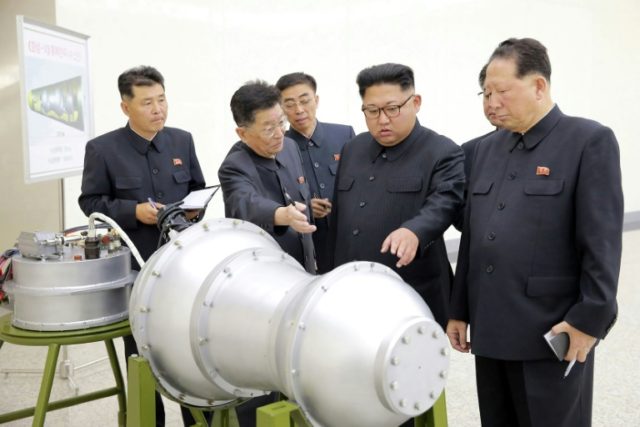North Korea’s latest nuclear test is also a test of China and the resolve of the United States.
On Sunday, North Korea set off its sixth nuclear explosion. Tremors from the explosion, which was as much as 10 times bigger than the previous test last year, could be felt in cities in China’s northeast.
The U.S. responded to the test by saying it would put together trade sanctions that would cut off trade with North Korea. China is by far North Korea’s largest trading partner, buying $2.34 billion of Korea’s estimated $2.8 billion of exports in 2015 and selling it $2.95 billion of goods. No other country has even 1/10th that level of trade with North Korea.
“There’s a lot we can do to cut them off economically, much more than we’ve done,” Treasury Secretary Steve Mnuchin said in an interview on Fox News Sunday.
Asked if that would include unilateral sanctions against Chinese banks and other companies doing business with North Korea, Mnuchin said: “We are going to strongly consider everything at this point and, again, I will draft a package for [President Trump’s’ strong consideration that would go as far as cutting off all trade and other business.”
“This behavior is unacceptable, and if countries want to do business with the United States, they obviously will be working with allies and others to cut off North Korea economically,” Mnuchin said.
That seemed to be a challenge to China to cooperate with U.S. sanctions against North Korea or risk facing sanctions itself. If there were any doubt about that, it was erased by a subsequent tweet from President Trump.
This notion of “stopping all trade with any country doing business with North Korea” is a change in tone and substance from the Trump administration’s earlier stance, when the administration appeared willing to put aside its complaints about China’s unfair trade practices in an effort to win over China’s support to restrain North Korea. Instead of hinting at easier trade relations to get China’s cooperation, the administration is now threatening to block all trade with the U.S. if China and others will not stop all trade with North Korea.
The president’s tougher stance on trade echoes the comments made by Steve Bannon in his August 16 interview with Robert Kuttner of the liberal magazine The American Prospect.
“There’s no military solution to [North Korea’s nuclear threats], forget it. Until somebody solves the part of the equation that shows me that ten million people in Seoul don’t die in the first 30 minutes from conventional weapons, I don’t know what you’re talking about, there’s no military solution here, they go us,” Bannon said. “To me, the economic war with China is everything. And we have to be maniacally focused on that. If we continue to lose it, we’re five years away, I think, ten years at most, of hitting an inflection point from which we’ll never be able to recover.”
The timing of the test is notable. It comes just as China’s leadership is set to hold its Communist Party congress this week, marking the start of China’s President Xi Jinping’s second term. It is a sort of presidential inauguration, political convention, and state of the union address all wrapped up into one. It is meant to show off the power of Xi at home, the prosperity of China, and its influence–even dominance–in the region.
Having North Korea set off a nuclear bomb that rattles China’s cities is an embarrassment for Xi, potentially a signal that he may have less influence over his smaller, impoverished neighbor than his posture of being regionally dominant would otherwise suggest.
President Donald Trump highlighted this challenge to Xi in a pair of tweets Sunday morning.
While some have interpreted that as Trump being gentle on China, perhaps letting it off the hook for North Korea’s actions, it is much more likely to be interpreted in China as a challenge to Xi’s leadership. The Chinese president does not want to be seen as having “little success” at something he is attempting to accomplish.
China, however, may still be attempting to out-maneuver the U.S. by using North Korea to win further concessions on trade. Bannon warned about these tactics in his August 16 interview with Kuttner.
“We’re at economic war with China,” he said. “It’s in all their literature. They’re not shy about saying what they’re doing. One of us is going to be a hegemon in 25 or 30 years and its going to be them if we go down this path. On Korea, they’re just tapping us along. It’s just a sideshow.”

COMMENTS
Please let us know if you're having issues with commenting.